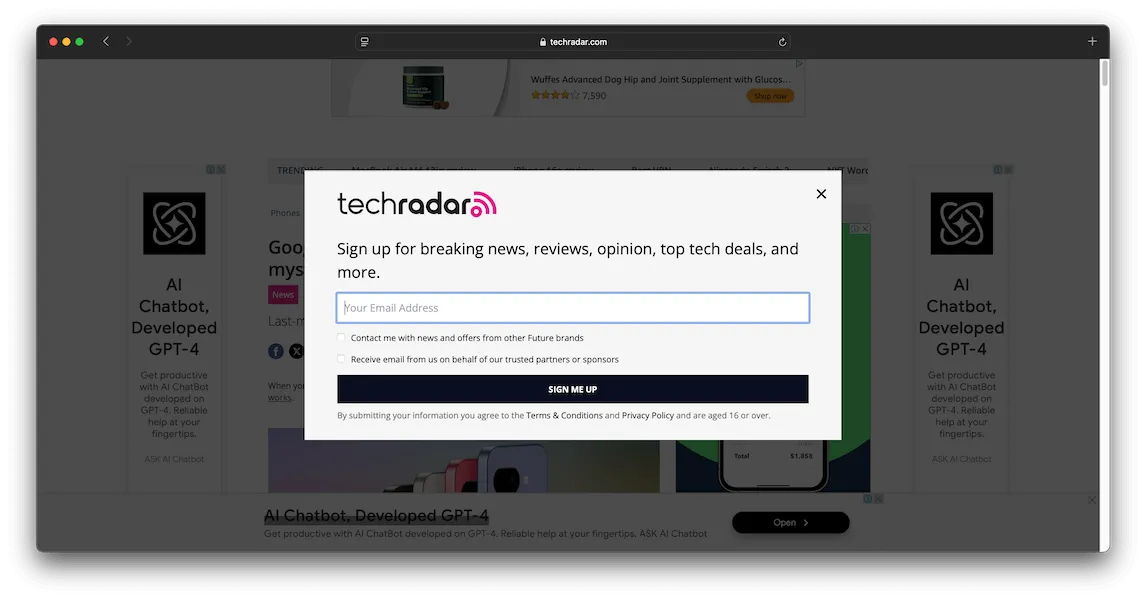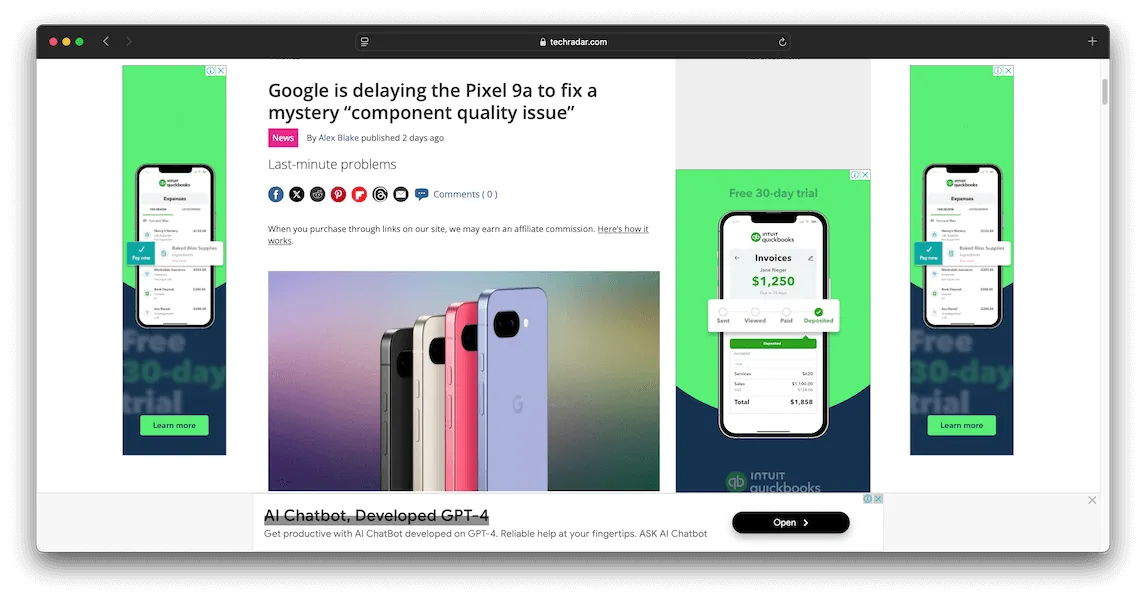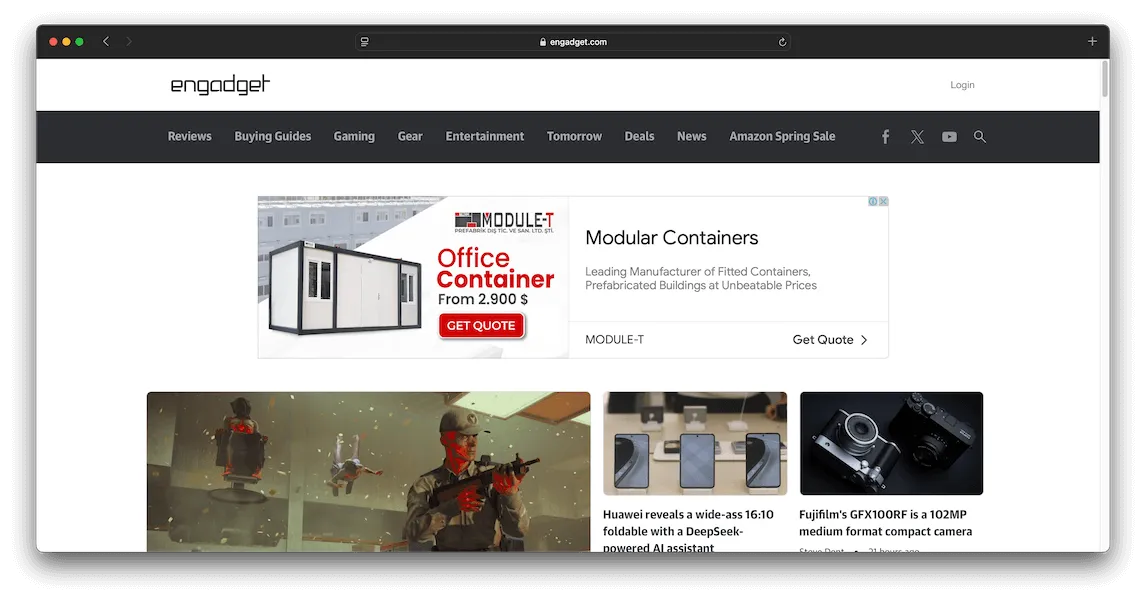So many browser extensions needed just to make the web usable
I use Firefox as my daily driver, mainly because I'm just used to it and it's really the only true alternative to the virus known as Google. Of course, on the Mac platform you've also got Safari, but I honestly don't know why anyone would use that browser given how gimped it is. The best ad-blocking extension for Safari, to the best of my knowledge, is Adblock Plus, but they sold out their values long ago with their dumb "Acceptable Ads" programme.
I stopped using Adblock Plus about five years ago after it stopped blocking ads on YouTube. Some ads were getting through, and the Adblock Plus team appeared to be responding to user complaints as if there was nothing wrong.
YouTube is at war with its users
I hate Google with a passion. They are the embodiment of evil in the corporate space. A typical example of a Big Tech monopoly which weaponises its immense power, money and influence to control narratives, suppress free speech, hurt content creators, and shamelessly exploit its users. They are completely out of control and couldn't care less if they tried.
Ever wonder why comments on YouTube videos all seem to look the same, with no diversity of opinion, all strangely positive and joyful? That's because Google has implemented a massive censorship system on YouTube in which entirely reasonable comments of alternative views are simply hidden to anyone but the author who posted it. They literally pretend comments are published while lying to the user's face. Technically, this is a form of shadow banning, and of course Google – like all the Big Tech cartels – will deny it.
Do you want to criticise Google? Do you have concerns about certain vaccines? Do you think 'gender-affirming' surgery on minors is genital mutilation and child abuse? Do you think vandalising Tesla vehicles and endangering the lives of others in order to pressure someone to stop working for the U.S. government is an act of terrorism? LOL, well good luck posting that on YouTube, because chances are your comments will be censored.
Google can, of course, try its best to stop people from finding videos that expose audiences to the truth, but they obviously can't just censor someone's speech in a video because that would be far too obvious to anyone, but they sure as hell can do it discreetly in the comments section.
All the while, of course, shoving ads down users' throat every 30 seconds. I mean, turn off your adblocker and try watching a five minute video on YouTube. Good fucking luck to you. Google is the embodiment of evil. All they care about, ultimately, is their bottom line, even if it's at the expense of morality, of which they have none.
In 2018, a YouTube executive named Lyor Cohen described the company's strategy for making money on the YouTube platform:
There's a lot more people in our funnel that we can frustrate and seduce to become subscribers.
For context, he was clearly talking about YouTube Premium, the dumb as fuck paid service that was introduced in 2018 (before then, it was called YouTube Red, first introduced in 2015). Convenient timing, right? They clearly knew that charging $11.99 a month to remove ads wasn't going to win over users, so in order to make it a compelling option, they started shoving ads down our throats around the time they were developing this overpriced bullshit, in an effort to extort users into paying for the privilege of not losing their shit. If that isn't corporate cartel behaviour, I don't know what is. All I can say to that is... FUCK OFF GOOGLE.
If the U.S. government had the balls to throw a few Big Tech CEOs in prison for antitrust and racketeering, we all know this type of corporate malpractice across the industry would come to a quick and abrupt end. Why? Because these company executives only care about themselves, and not going to prison is such a powerful motivator for corporate psychopaths.
The web is literally broken, and it's getting worse
I recently tried using the web without any extensions installed just to see how bad it really is. It's fucking dire. The problem is not just the ads, but also the popups that beg you to give them your email address to sign up to some bullshit newsletter, the GDPR cookie notices, and all other manner of bullshit. I mean, look at these examples:



My personal pet peeve is the newsletter popups. They are the most egregious invention ever, and it's borderline criminal for blogs – of all sites – to be displaying them randomly, and without warning, on top of the content you're trying to read. It's truly egregious. The web is unusable without using extensions to stop this behaviour.
Extensions like uBlock Origin are an absolute life saver. Not for Google, of course, which randomly started disabling the extension on user's browsers due to the rollout of Manifest v3, the latest version of the extension specification for Chrome. Like the issue of censorship, Google cannot just kill off uBlock Origin and other extensions that block ads or improve user privacy, because that would be far too obvious and would invite unwanted scrutiny from antitrust regulators in the U.S. and EU, but they can introduce new technical specifications which place disproportionate new restrictions on what extensions can do, under the fake guise of improving user privacy. LOL, since when does Google care about user privacy? Oh that's right, they care about the fact these extensions are protecting users from The Google Machine.
I mean, is it any wonder why Chrome for Android/iOS doesn't support extensions? It's not for any technical reason, it's simply because they want to maintain monopolistic control like Apple does, and to stop people from blocking ads and trackers. If they could, they would do the same for the desktop version of Chrome. So, they do the next best thing... slowly but surely, with each new release, gimp the extensions API until extensions can longer effectively block ads or stop trackers, and they'll come up with an elaborate excuse for each new release to justify its actions.
It's hilarious how a company that relies heavily on advertising revenue and the collection of user data, chooses to publicly voice concerns over the Web Request API which a variety of legitimate extensions – such as uBlock Origin and Privacy Badger – rely on in order to block ads and trackers.

Yes, I know it is possible to re-enable the extension, but for how long? (And they know the majority of users will not even do this).
Firefox really is the only alternative
The majority of the browser market is, directly or indirectly, controlled by Google. Many browsers are based on Chromium, so they're at the mercy of The Google Machine. The only real competitor in the browser space is Firefox. I mean, I'm not entirely happy with some of the decisions that Mozilla has made in recent years, but I am grateful that they are at least refusing to follow Google's bullshit worldview on the Web Request API. In June 2022, the Chief Security Officer at Mozilla publicly said that the security benefits in Manifest v3 by preventing Web Request blocking were "not obvious". While Firefox has adopted the Manifest v3 specification to allow extension developers to port their Chrome extensions over to Firefox, the browser will continue to allow extensions to utilise the Web Request API.
Now that Chrome users are starting to see uBlock Origin being forcefully uninstalled by Google, I think Mozilla is going to see a noticeable uptick in new users to the Firefox browser.
By the way, I am aware that the Brave browser has a built-in ad-blocker called Shields (and Chrome does, too, but obviously completely gimped to benefit Google), but I don't know how good Shields is compared to uBlock Origin. I tried Brave a few times before, and I just don't get it. I don't see how it is any better than any other browser in any meaningful way. But, if all you care about is blocking ads and you still want to use a Chromium-based browser, then I guess it doesn't hurt to give Brave a try, although it might also be impacted by the changes that were introduced in Manifest v3, unless Brave are going down the Mozilla route by continuing to allow use of the Web Request API by extensions like uBlock Origin.
But anyway, where the fuck did Brave come from? A bit like Zoom, the Brave browser just suddenly became popular out of nowhere. It all just seems a bit sus to me. I mean, who calls a software product Brave? Lol. But, you know, it has a following. Some people swear by Brave, for reasons that I don't (yet) understand, but for me, Firefox seems to be the only reasonable independent choice out there right now.
Must-have browser extensions
Just to note, if you really do prefer Chrome as your browser of choice, there is a Manifest v3-compatible variant of uBlock Origin, called uBlock Origin Lite, but it has limited capabilities out of the box, as explained by the extension developers:
[uBlock Origin Lite] does not require broad "read and modify data" permission at install time, hence its limited capabilities out of the box compared to uBlock Origin or other content blockers requiring broad "read and modify data" permissions at install time.
However, [uBlock Origin Lite] allows you to explicitly grant extended permissions on specific sites of your choice so that it can better filter on those sites using cosmetic filtering and scriptlet injections.
The browser will then warn you about the effects of granting the additional permissions requested by the extension on the current site, and you will have to tell the browser whether you accept or decline the request.
Sounds like the familiar Google tactic, doesn't it? Frustrate users into submission. I mean, who's going to sit there and grant permissions to every site they are visiting, just to allow uBlock Origin Lite to effectively filter website content? Google knows this, and that's why they designed Manifest v3 with these restrictions.
Anyway, below is a list of Firefox extensions that I must always have installed on any computer I use. Some of these extensions may also be available for Chromium-based browsers, too.
uBlock Origin
Well, I've already spoken about this at some length, so doesn't need much of an introduction, but I do want to mention one of the features of the extension that I use often (not related to ad-blocking), and that's the ability to block elements on a website. I use this quite often to block sections of a website. For example, I use it on X to block the "Who to follow" box that appears on the right-side. Aside from that, the ad-blocking is the best of any extension I've used before.
Privacy Badger
This is an extension managed by the Electronic Frontier Foundation (EFF) that automatically learns to block invisible trackers. A must-have in this day and age.
Dark Reader
I love this extension! Quite simply, it's a dark mode for every website, and it works surprisingly well. It's amazing the difference it makes to eye comfort, especially at night. It's sometimes an even better Dark Mode than what's offered by websites.
I still don't care about cookies
https://github.com/OhMyGuus/I-Still-Dont-Care-About-Cookies
This is one of those GDPR anti-annoyance plugins. This is the community version of the popular "I don't care about cookies" extension, which had been (suspiciously) acquired by Avast, so a developer going by the name of Guus forked the original project.
Shortkeys
This is another must-have extension. It's a huge time-saver. It allows you to create custom keyboard shortcuts for your browser. I have the following custom shortcuts set up:
Close other tabs
command+shift+option+w
Close tabs to the left
command+shift+option+[
Close tabs to the right
command+shift+option+]
Pin/unpin tab
command+shift+option+e
Move tab left
command+shift+option+left
Move tab right
command+shift+option+right
SponsorBlock for YouTube
Another must-have extension and a huge time-saver, it automatically skips sponsorships, subscription begging and other annoyances on YouTube videos. When a user of the extension reports sponsorships or subscription begging on a video, SponsorBlock stores a record of the report in its database. When another user comes across the same YouTube video, the section of the video that was reported will be automatically skipped by the client-side extension. There is also a rating system to help ensure only genuine and high quality submissions are used by SponsorBlock.
The extension uses a privacy-preserving 'K-Anonymity' query system for querying YouTube videos against the database.
Return YouTube Dislike
https://returnyoutubedislike.com
In 2021, The Google Machine decided that it was too offensive and not conducive to civilised society to continue displaying the dislike count on YouTube videos, and they announced that by the end of that year, it was going away. Apparently, removing the dislike count helps "protect creators from harassment". Fucking retards. Nothing to see here, just another group of people with a severe case of the woke mind virus.
As a consequence of yet another dumb censorship decision by Big Tech, this extension came into existence to fill the void. But Google took notice, and responded by cutting off public access to the API which provides the dislike count for YouTube videos. So now, the extension has its own dislike count database.
This extension is useful because it helps you to see if you've just stumbled upon a bullshit YouTube video that's not worth your time watching. Meanwhile, Google employees are too busy having group therapy sessions to understand the basic utility of the dislike counter. It helps users to convey when they don't like what they've just watched (you know, freedom of expression?), and allows users to decide whether to engage with a YouTube video before they click the play button. But, never mind. I mean, after all, the majority of people are just dumbass bigots that can't be trusted with freedom anymore. Censorship good. Freedom of expression bad.
Conclusions
The state of the web? It sucks. Censorship becoming the norm, out-of-control ad placements, invasive cross-site tracking, bloated site designs which requires endless doom scrolling just to get to actual content, and clunky-ass "single page app" sites like YouTube and Reddit which are about as reliable as a festering pile of dog shit on a hot sidewalk.
Browser extensions like uBlock Origin, Privacy Shield and SponsorBlock literally make the web usable again. The absence of any real browser competition means that Google can do whatever the fuck it wants and without consequences. It seems that every industry eventually befalls to a duopoly. Windows and Mac. Android and iOS. Firefox and Chrome. The list goes on. It was a huge loss after Opera gave up on its Presto rendering engine (and later selling itself to a Chinese consortium). The loss of yet another rendering engine was a huge loss to competition. In the short-run, that absence of competition might be good for developers (since it's one less rendering engine that needs to be tested against), but in the long-run, that lack of competition hurts all users.
I sincerely hope that Mozilla and the wider community will continue to develop the Gecko rendering engine, and for Firefox to maintain as much technical independence as possible from the likes of Google and Apple. The browser market has been undergoing massive consolidation in recent years, to the benefit of Big Tech only.